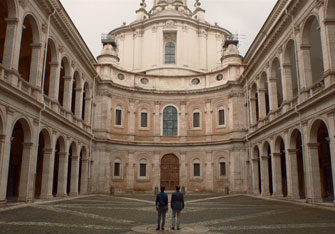
La Sapienza, Eugène Green’s fifth feature-length film, is a significant and often profound meditation on the passage of time, art and architecture, wisdom and knowledge (as the movie’s title implies) and the nature of love.
Works by Green that have previously set my pulse racing include his productions of classical theater (in which he tried to perform in authentic 17th-century French pronun-ciation) and his magnificent delivery (again in “original” pronunciation) of the great preacher Bossuet’s Sermon on Death (recorded on CD), but that probably explains more about the rarefied world in which I live than it does about Green’s interesting cinematic output.
Just as I was beginning to miss Green’s own memorable intonation in La Sapienza, lo and behold, he popped up in a minor role in this movie as a Chaldean, an inhabitant of the lands that used to constitute ancient Mesopotamia, sounding for all the world exactly like his recreation of Bossuet. Given the self-regarding nature of much of the film (for example, two of the characters go to see a performance of Molière’s Le Malade Imaginaire by a French theater troupe called Théâtre de la Sapience, the name of a troupe formed in the 1970s by Green himself), Green’s Chaldean accent may well be an oblique reference to his earlier work on recovering voices and accents from the past.
The movie focuses on a 50-year-old prize-winning architect, Alexandre Schmid (played by an actor discovered by the Dardennes brothers, Fabrizio Rongione), who, disillusioned with his life in Paris, decides to travel to Italy with his psychotherapist wife Aliénor (performed by Green movie regular Christelle Prot) to write a book on the Italian Baroque architect Francesco Borromini; the title of the film refers to a church in Rome designed and built by Borromini.
Soon after arriving in Italy, the couple, who are clearly at a crossroads in their marriage, meet a young Italian brother and sister at Lake Maggiore, 18-year-old Goffredo (Ludovico Succio), who is about to study architecture in Venice, and 16-year-old Lavinia (Arianna Nastro), who is afflicted with a mystery illness redolent of the vapors suffered by women in the nineteenth century. While Aliénor stays behind with Lavinia, the two men travel through Italy to look at various Borromini buildings.
Green’s distinctive directing style (his actors are always carefully framed by the camera and perform in a deliberately non-naturalistic way) reminds me of Pasolini’s cinema, and there were moments in the movie – Goffredo inviting Aliénor into his bedroom, or the older man watching the younger man sleeping – when I was sure we would be entering the territory of a film like Teorema (in which a young man seduces all members of a family). But La Sapienza remains at all times decorous and rigorously restrained. Green is far more interested in the transmission of knowledge from one generation to another and in the role played by light, both figurative and literal, than in Pasoliniesque sexual perversity.
All four principal actors are excellent – Christelle Prot in particular is a mesmerizing presence onscreen – and the clarity and slowness with which they speak in both French and Italian would make this an ideal teaching manual for students studying either or both languages. And who can resist the beauties, both architectural and natural, of Italy, filmed with grace by Green?
Favorite
